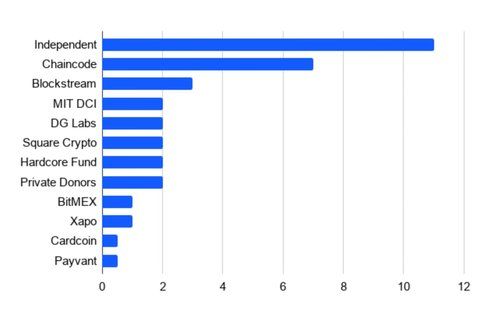If you follow Bitcoin Twitter, you may have seen some discussion about the funding of bitcoin developers going on lately. Here is an explanation of how it works now and how it might change.
(Note that we speak here of the funding of open source development. We will have another article about VC and other private sources of funding for developers wishing to build apps or hardware on top of Bitcoin.)
The Bitcoin Development Funding Problem
There is a somewhat widespread idea that if you're a bitcoin developer you must have been investing early and be crazy rich by now - which means that funding development is not really a priority. This is far from capturing the whole picture however:
- Not all bitcoin developers got in early and it is a good thing because it shows that development isn’t restricted to a small group of “OGs”;
- We want as many new talented developers to join as possible and having a stable funding environment is the best way to incentivize them to do so;
- Not all bitcoin developers who got in early made a fortune anyway. Remember that Andreas Antonopoulos asked for support a few years ago because of personal circumstances, despite having been all-in as a Bitcoin evangelist since 2012.
- All work deserves funding and appreciation, especially so when it comes to bitcoin development - if your work helps secure a 200B$ market that can potentially change the world for the best, your efforts deserve to be acknowledged.
- If you talk to people at developer conferences like Advancing Bitcoin you'll meet a lot of devs that love Bitcoin, follow it technically and could help improve it a lot but postpone getting into it full time because it isn’t clear how they could make a living out of it.
- Bitcoin is still in its early days and a lot of work, especially in terms of privacy, security and efficiency needs to be done before Bitcoin can face significant adversarial pressure. History shows (think Heartbleed and Shellshock) that poor maintenance leads to systemic risks.
The Corporate Solution
It is not as if there was no funding at all for bitcoin development however. There are already a number of bitcoin companies employing bitcoin developers to work on open source projects. Bitmex recently published a report that explains how the funding is distributed. This is their break down of Bitcoin Core’s main developers’ sources of funding:

There is therefore a fair amount of Bitcoin Core developers not employed by companies, and this is not to speak of developers that do important work for the bitcoin ecosystem but aren’t Bitcoin Core developers. It is also not always possible for companies to employ full-time open-source developers.
In effect, an alternative means of support has gained traction recently: Bitcoin companies giving grants to specific developers, usually (but not always) for a particular project. In the last four months alone, Bitmex, Kraken, OkCoin and Square have given seventeen grants to different developers. So much so that PolyLunar created a grant tracker to keep track of them all.
Limits to the Corporate Solution
This funding model helps diversify funding and allows developers to focus on open-source projects but has some limitations.
First because it doesn't really empower individuals to contribute: many people outside of these companies may want to contribute small sums on a regular basis. Second, because it centralizes the funding decision in the hands of a handful of grant givers, which could distort incentives and development agendas (Deribit has a good analysis of the specific problems a centralized governance raises for open source development). Third because this model mostly turns around a grant being given here and there to one specific individual developer, and rarely provides secure employment. It doesn’t make for stable resources, one of the main worries of a number of developers who could otherwise be tempted to quit their day job or take up less freelance tasks.
Note that the Human Rights Foundation's Bitcoin Development Fund answers the first worry: people can give to the fund, in fiat or bitcoin, and it then gives a grant to a bitcoin developer. The other two concerns, centralization and instability, remain.
A growing number of people think that we should develop, in addition to the models I mentioned, a funding approach that manage to, at the same time:
- not centralize distribution decisions in the hands of a few;
- be accessible to individual donors, however small;
- provide a stable and continuous source of income to the recipients.
The 'Decentralize Funding' Discussions
One way to achieve this three-fold goal has been to use the GitHub Sponsor feature, through which one can set up a recurring payment to a specific developer, working on bitcoin or not. Until now, only a handful of bitcoin developers had a GitHub Sponsor page, and few people used it to donate.
This has recently changed: Matt Odell teamed up with Dennis Reimann to build the Bitcoin Donation Portal, a list of bitcoin developers that individual bitcoiners can support. It's already a small success: there are now almost thirty developers listed, some of whom went from two to thirty sponsors in the span of a few days. It’s hard to say how much this solution can scale however.
A number of people are currently debating what else can be done. The discussions going on are conceptual (what funding model do we want, individual to individual, individual to group, individual to pool, etc.), technical (should it be a bitcoin based platform, what is the best way to set up recurring payments, etc.) as well as legal (should it be a 501(c)3 fund, how, etc.). A few people are brainstorming on GitHub for instance. There is also a Telegram group for people interested in building a long term Bitcoin development funding platform. You can reach me on Twitter or Keybase to get the address (it's a discussion group and we'd like to keep it manageable and avoid bots). We’re looking forward to hearing bitcoiners’ thoughts and propositions on this topic!

